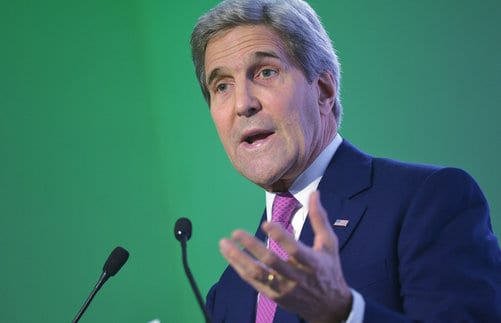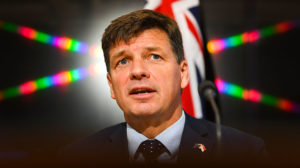The United States and China have issued a joint statement saying they are “firmly committed” to cooperating on tackling climate change, in a hopeful sign deteriorating relations between the two powers will not hamper global efforts to reduce greenhouse gas emissions.
The statement, released late Sunday and signed by US climate envoy John Kerry and Chinese climate envoy Xie Zhenhua, follows days of intensive talks in Shanghai. It contains no hard details or targets, but reaffirms each country’s commitment to the Paris Agreement, tentatively setting the scene for a successful UN COP 26 climate summit in Glasgow in November, when countries are expected to ratchet up their emissions targets.
It leaves Australia further isolated over its reluctance to go beyond tokenistic climate policy, and will put yet more pressure on Prime Minister Scott Morrison to come up with something meaningful to take to Glasgow.
The joint statement comes ahead of President Biden’s virtual climate summit with world leaders later this week on April 22-23, a summit China now looks likely to participate in.
The language of the statement is unequivocal, stressing the “seriousness and urgency” of the “climate crisis”, and promising each country will ratchet up its emissions targets ahead of COP 26.
“The United States and China are committed to cooperating with each other and with other countries to tackle the climate crisis, which must be addressed with the seriousness and urgency that it demands,” the statement reads.
“Both countries look forward to the US-hosted Leaders Summit on Climate on April 22/23. They share the Summit’s goal of raising global climate ambition on mitigation, adaptation, and support on the road to COP 26 in Glasgow.”
The statement touches on most elements of decarbonisation, including renewable energy, sustainable agriculture, green hydrogen, aviation and shipping, low carbon buildings, grid reliability, battery storage and carbon capture and storage.
It also commits to “maximise international investment and finance” to finance the expensive transition to a zero-carbon global economy, and touches on biodiversity loss, a subject that is increasingly being discussed with the same urgency as global warming.
The meeting between Kerry and Xie has echoes of the November 2014 meeting between then-US president Barack Obama and China’s President Xi Jinping, which resulted in a joint statement that is now seen as perhaps the most decisive factor in the success of the 2015 UN COP 21 climate summit in Paris that led to the Paris Agreement.
Since then, the seemingly friendly relationship between the two countries has dramatically deteriorated, with trade wars, geopolitical tensions over Hong Kong, Taiwan and the South China Sea, China’s human rights abuses against the Uyghurs in Xinjiang, and four years of climate wrecking policy under Donald Trump which included the US withdrawal from the Paris agreement, all putting a strain on the relationship.
Through all that, President Xi maintained his rhetorical support for climate action and building an “ecological civilisation”, and last year committed China to achieving “carbon neutrality” by 2060. However, China’s rampant expansion of coal-fired power from 2018 raised serious questions about Xi’s practical commitment to climate action. This concern was further fanned by a lack of ambitious climate policies in the Chinese Communist Party’s latest Five Year Plan.
Since arriving at the White House in January, Biden has reversed Trump’s climate change-denying policies, rejoining the Paris Agreement and announcing a host of ambitious climate policies. But he has maintained Trump’s frosty attitude towards China.
As the world’s two biggest emitters, the US and China together account for more than 40 per cent of global carbon dioxide emissions. With more than 10 billion tonnes of CO2 emissions annually, China’s emissions are twice those of the US.
Under Paris, the US committed to reduce its emissions by 26-28 per cent on 2005 levels by 2025, while China committed to make sure its emissions peak before 2030. Climate Action Tracker classes China’s target as “highly insufficient” and the US’s as “critically insufficient” to meet the Paris goal of keeping global temperature rises well below 2 degrees and as close 1.5 degrees as possible. For hope to remain alive, each country must therefore significantly increase its targets at Glasgow.
Peter Christoff, an expert on international climate politics and honorary associate professor at the University of Melbourne, said while there was little substance, the announcement was a “positive development because it indicates a deep and enduring commitment to dealing with the global crisis”.
He said the length of the negotiations suggested more substantial measures were coming. “You don’t send an envoy somewhere for 12 days for a headline statement,” he said.
“I would think given then way they’ve previously handled this, that they will come out with something like the joint statement in 2014 … that sets the agenda for Glasgow,” he said.
He added it would put further pressure on Australia to ramp up its own weak climate policy.







